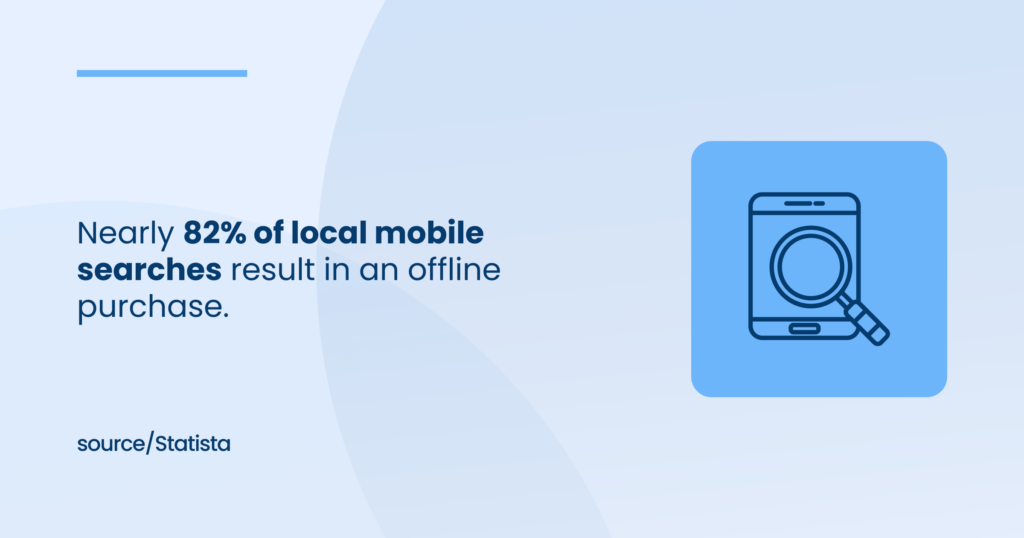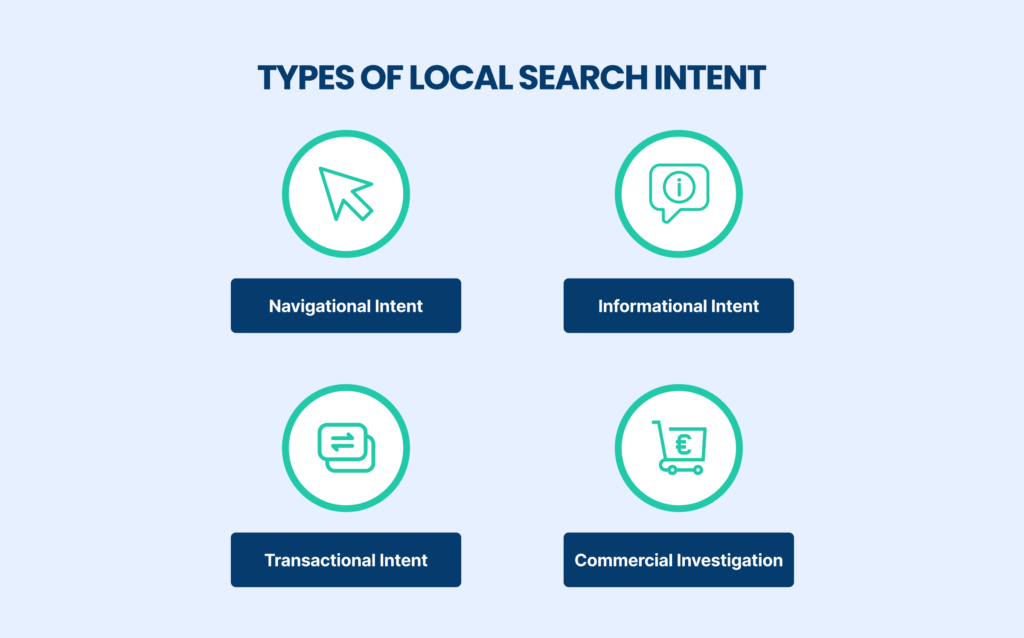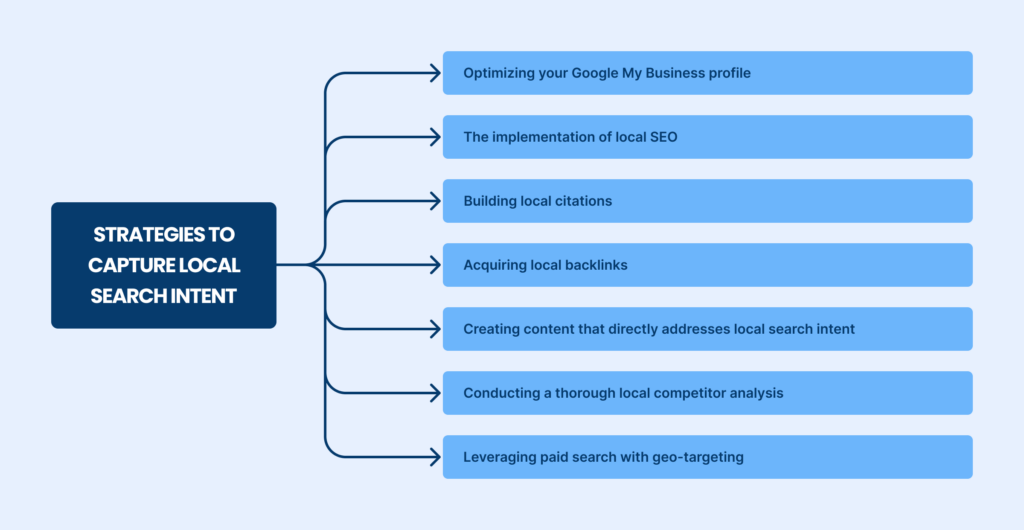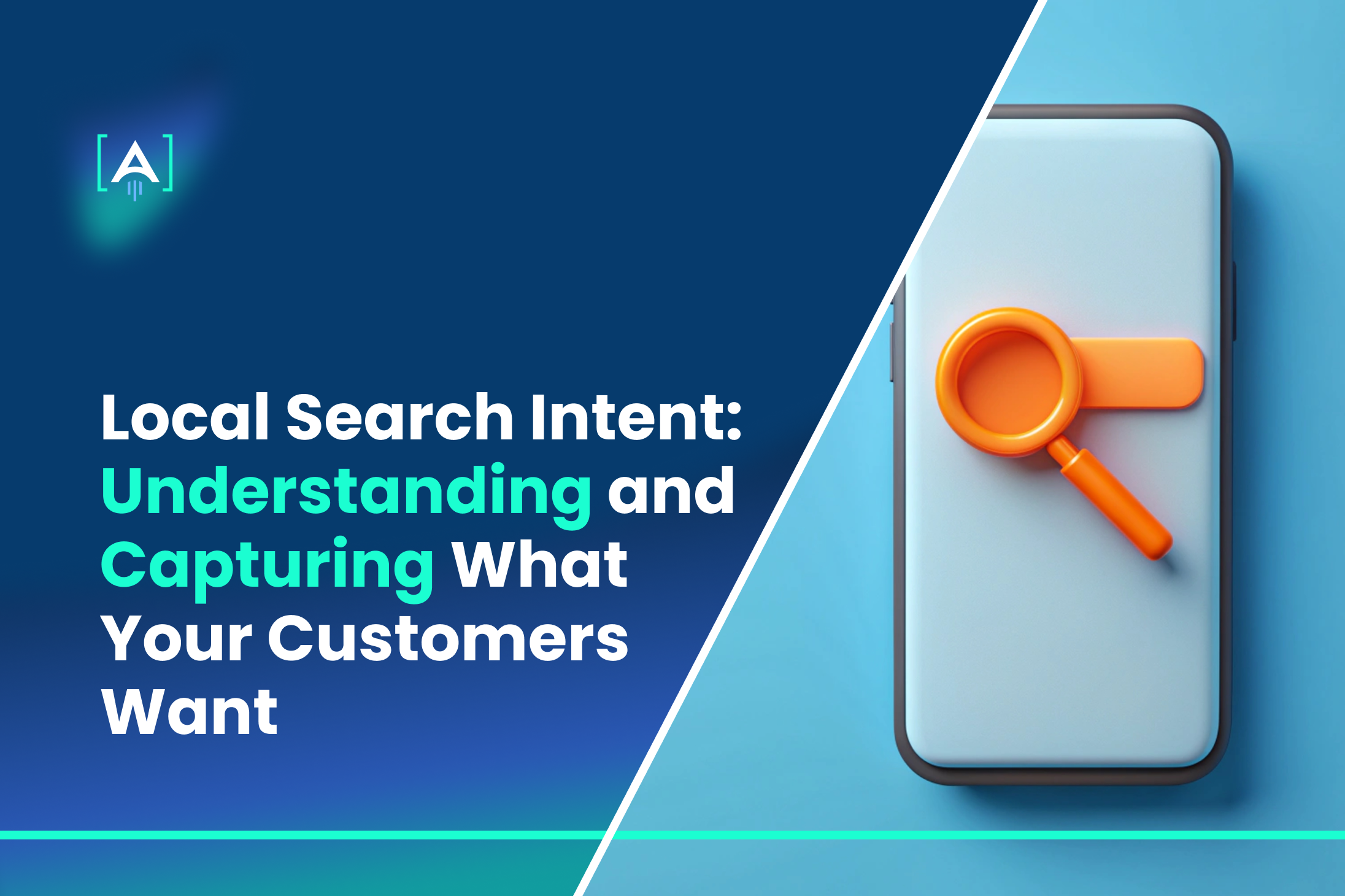Have you ever wondered why your business isn’t popping up when potential customers search for services you offer in your area?
You’re not alone: many companies struggle with capturing local search intent, a critical factor in connecting with customers ready to engage.
In fact, according to a recent survey by Statista, nearly 82% of local mobile searches result in an offline purchase, underscoring the importance of being visible when customers are actively looking.
Understanding and harnessing local search intent is more than just appearing in search results; it’s about knowing exactly what your customers want and ensuring your business is the answer they find.
Whether they’re searching with navigational intent to locate your store or with transactional intent to make a purchase, capturing these moments is crucial for your business’s growth.

This is where partnering with a specialized Local SEO Agency can make all the difference.
An expert agency can help you understand the various types of search intent and tailor your strategies to effectively meet your audience’s search queries.
By using advanced keyword research tools and other tips we’ll discuss, you can ensure your business stays visible in key moments.
You will learn how to determine and capture local search intent, which will help you convert clicks into customers and drive real, measurable results for your business.
What Is Local Search Intent?
Imagine a potential customer searching for “best pizza near me” on their phone.
Within seconds, they’re presented with a list of nearby pizza places, complete with reviews, directions, and even the option to call or order online.
This quick and relevant response from search engines is powered by local search intent—the user’s underlying goal is to find a nearby service or product in real-time.
Local search intent is the specific purpose behind a user’s query when looking for businesses, services, or products within a particular geographic area.
Unlike broader search intent categories—such as informational intent (seeking information) or transactional intent (ready to purchase)—local search intent focuses on meeting immediate, location-based needs.
Understanding whether a user is searching to find a specific store or to learn more about local services is crucial for local businesses. Knowing and capturing this intent can greatly benefit them.
For businesses, optimizing for local search intent goes beyond basic local SEO practices.
It involves using geo-targeted SEO strategies and local SEO audit tools to ensure your business appears prominently in search engine results pages when potential customers are searching.
Factors like building local citations, acquiring local backlinks, and conducting thorough competitor analyzes all contribute to improving local SEO ranking factors.
For instance, local SEO for real estate businesses might involve creating content that aligns with the commercial search intent of buyers looking for properties in a specific area.
Incorporating local SEO for real estate can help tailor your content to align with the specific commercial search intent of property buyers in your area.
At the same time, a restaurant might focus on navigational search intent to ensure that people can easily find their location and menu.
By recognizing the user’s intent behind specific search queries, businesses can fine-tune their SEO strategies and online presence to align perfectly with what local customers are looking for.
This precise alignment not only boosts visibility in local search results but also increases customer engagement, driving more foot traffic, inquiries, and conversions through targeted local SEO marketing efforts.
Types of Local Search Intent
If you’re a business looking to capture prospects via local search, it’s crucial to identify these different kinds of search intent.
Businesses must, therefore, find and address these intentions to optimize their online presence in accordance with audience needs.

1. Navigational Intent
Navigational intent happens when users search for a particular website or location.
For example, when someone types “Starbucks near me” into a search engine, they have navigational search intent.
They already know the brand or place they are looking for and want to find it quickly.
Source: Google
To capture this search intent, businesses should focus on local SEO practices, such as optimizing their Google My Business profile and ensuring their business details are consistent across all platforms.
This will help your business appear on search engine results pages (SERPs) when users with navigational intent are looking for you.
Navigational keywords like your business name, specific locations, and relevant categories should be well-integrated into your online listings.
2. Informational Intent
Informational intent involves users searching for specific information.
For example, a user might search “how to choose the best pizza place in New York.”
Source: Google
This informational search intent is about gathering knowledge rather than making an immediate purchase.
To address informational intent, businesses should focus on creating content that answers common questions connected with their industry.
This could include blog posts, guides, and FAQs optimized with informational keywords.
Using keyword research tools to identify informational queries can help you create valuable content that ranks well in search engine results.
An effective content strategy targeting informational intent can attract users early in decision-making, build trust, and position your business as a go-to resource.
3. Transactional Intent
Transactional intent means a user is ready to purchase or book a service.
For example, when someone searches for “buy running shoes in San Francisco” or “book a hotel room in Chicago,” they have transactional intent.
Source: Google
To capture these high-intent users, businesses must optimize their sites for transactional searches by ensuring a smooth, conversion-friendly experience.
This can be achieved by implementing clear calls to action, such as “Buy Now” or “Book Here” buttons, and optimizing your site for mobile devices.
Leveraging local SEO techniques, such as using transactional keywords relevant to your area, can help your business reach the top of search engine results when users are ready to take action.
4. Commercial Investigation
Commercial investigation happens when users compare different products or services before purchasing.
For instance, a search like “best gyms in Miami” reflects commercial search intent as the user explores options.
Source: Google
Businesses should respond to commercial intent by providing detailed comparisons, reviews, and feature-rich website content.
Creating pages that address common commercial queries and incorporating customer testimonials can help build credibility.
Additionally, conducting comprehensive keyword research to target commercial search intent effectively will improve your chances of appearing in relevant search results.
This approach attracts potential customers and helps them move from consideration to conversion.
How to Identify Local Search Intent
Identifying local search intent is critical for businesses that want to capture and convert local customers effectively.
76% of people search for something nearby on their smartphone, visiting a related business within a day, so it’s clear that understanding and responding to local search behavior can significantly impact your business’s success.
Here’s how to do it:
1. Analyze Search Queries
- Use Google Search Console to track the search queries driving traffic to your site.
- Focus on local-specific keywords like “near me,” city names, and neighborhoods.
- These keywords are strong indicators of navigational or transactional search intent.
2. Leverage Keyword Research Tools
- Employ keyword research tools such as Ahrefs, SEMrush, or Google Keyword Planner.
- Identify informational, navigational, and transactional keywords that your target audience uses.
- Understanding these keywords will help you align your content with the specific search intent behind local queries.
3. Conduct Local Competitor Analysis
- Study your competitors to understand how they capture local search intent.
- Look at the keywords they target, their content strategies, and their ranking on search engine results pages (SERPs).
- Use these insights to identify gaps in your strategy and opportunities to target user search intent better.
4. Monitor User Behavior
- Use Google Analytics to observe how visitors interact with your website.
- Check which pages receive the most traffic, how long users stay, and what actions they take.
- High engagement on specific pages can indicate informational or transactional intent, guiding you in optimizing those pages further.
5. Utilize Google My Business Insights
- Analyze Google My Business Insights data to see how customers discover and interact with your business.
- Focus on the keywords that users search to find your listing and their actions, such as requesting directions or clicking through to your website.
- Use this data to refine your local SEO strategy, ensuring you more effectively meet the needs of local searchers.
Strategies to Capture Local Search Intent
Effectively capturing local search intent is crucial for driving traffic and conversions from local customers.

By implementing targeted strategies, you can ensure your business is visible to users with local search intent, positioning yourself as their top choice when they search online.
Optimize Google My Business
One of the most effective strategies to capture local search intent is optimizing your Google My Business profile.
Start by ensuring that all your business details—such as your name, address, phone number, hours, and services—are accurately filled out and updated.
Incorporate relevant local keywords into your business description to help your profile appear in local searches.
This can be supplemented by requesting positive reviews from your happy customers, which raises your ranking in local searches and builds trust with prospects.
Keeping your profile fresh with new photos, posts, and offers will keep your business fresh, engaging, and relevant for users looking for services like yours.
Focus on Local SEO
The implementation of local SEO is, therefore, very critical to any business targeting local search intent.
Start by optimizing all on-page elements, including titles, meta descriptions, and headers, with local keywords to help signal relevance to search engines.
Creating location-based content—like blog posts, landing pages, and guides tailored to specific neighborhoods or cities—can also enhance your local visibility.
Add local business schema markup to your website to help search engines better utilize and understand your location and services.
Lastly, since many local searches are conducted on smartphones, ensure your website is mobile-friendly to provide a seamless user experience.
Build Local Citations
Building local citations is another crucial strategy for capturing local search traffic.
Ensure your business has the same NAP—name, address, and phone number—in every online directory.
Claim and optimize your listings in the top local directories, including Yelp, Bing Places, or Apple Maps, to improve your presence in geographic search results.
Source: Yelp
Additionally, submitting your business to niche directories specific to your industry or location can drive more targeted traffic and reinforce your local relevance.
Generate Local Backlinks
Generating local backlinks is a powerful way to boost your website’s authority and capture local search intent—partner with complementary local businesses to exchange backlinks and cross-promote each other’s services.
Sponsoring local events or participating in community activities can also earn valuable backlinks from local news sites and event pages.
Additionally, consider writing guest posts for local blogs or online magazines, as these provide backlinks and position your business as a local expert.
Perform Local Competitor Analysis
Conducting a thorough local competitor analysis can provide valuable insights into how other businesses capture local search intent.
Analyze their content strategies, backlink profiles, and social media presence to understand what’s working for them.
Based on these insights, you can differentiate your business by offering something unique or better, positioning yourself more effectively in the local market.
Create Content for Local Search Intent
Creating content that directly addresses local search intent attracts and converts local customers.
Focus on developing content that answers common questions related to your industry in your area.
Use location-specific keywords within your content to ensure it ranks well in local search results.
Additionally, include visual content such as images and videos that showcase your business and community. These can increase user engagement and make your content more appealing to local searchers.
Utilize Paid Search with Geo-Targeting
Leveraging paid search with geo-targeting is another effective strategy for capturing local search intent.
Use Google Ads to target local keywords that have high transactional intent.
You ensure you reach the most relevant audience by setting your ads to appear only to users within a specific geographic area.
Using geo-targeted SEO techniques helps focus your advertising efforts on the most relevant local audience, boosting your visibility where it counts.
Incorporate ad extensions like location and call extensions to make it easier for users to find and contact your business, increasing the likelihood of conversion.
Tools and Technologies for Enhancing Local Search Visibility
Improving local search visibility requires specialized tools, effective analytics, and emerging technologies.
These resources help you understand and optimize your online presence to attract more local customers.
Local SEO Tools
Utilizing the right Local SEO tools is essential for managing and enhancing your local search performance.
Tools like Moz Local and SEMrush are indispensable for businesses looking to improve their visibility in local searches.
- Moz Local: Moz Local helps manage your business listings across various directories, ensuring your information is accurate and consistent. This consistency is critical for ranking well in local searches. The tool also helps build and manage local citations, essential factors in local search rankings.
- SEMrush: SEMrush offers a comprehensive suite of local SEO tools, including keyword research, site audits, and local rank tracking. With SEMrush, you can conduct in-depth competitor analysis to see how your rivals perform and identify opportunities to improve your local SEO strategy.
- BrightLocal: BrightLocal specializes in local SEO, offering features like local rank tracking, review management, and citation building. This tool helps businesses monitor their local search performance and manage their online reputation effectively.
Analytics and Tracking
Monitoring and analyzing your performance using tools like Google Analytics and Google Search Console is for continuously improving your local search visibility.
- Google Analytics: Google Analytics lets you check how local users interact with your website. You can track key measurements like traffic sources, user behavior, and conversion rates. Analyzing this data lets you identify which pages and keywords are driving local traffic and optimize them further.
- Google Search Console: Google Search Console provides insights into how your website is performing in Google’s search results. You can see which queries bring in local traffic, track your rankings over time, and identify any issues affecting your visibility. Search Console also lets you monitor your site’s performance on mobile devices, which is critical for local searches.
Using these analytics tools, you can make data-driven decisions to enhance your local SEO efforts and ensure your business’s visibility to potential customers.
AI and Machine Learning
Technologies like AI and machine learning are transforming how businesses approach local SEO.
These technologies offer new ways to optimize local search visibility by analyzing large amounts of data and making real-time adjustments.
- AI in SEO Tools: AI-powered SEO tools like BrightEdge and MarketMuse analyze content and provide recommendations to improve your site’s relevance and authority in local searches. These tools can automatically adjust your keyword strategies, optimize content, and suggest improvements based on current search trends.
- Machine Learning Algorithms: Search engines increasingly use machine learning algorithms to know user intent and deliver more relevant local search results. By understanding these algorithms, businesses can better match their content with what users are searching for, leading to higher rankings and more local traffic.
- Predictive Analytics: AI and machine learning enable predictive analytics, which can forecast trends in local search behavior. By leveraging these insights, businesses can stay ahead of the curve and optimize their local SEO strategies proactively.
Boost Your Local Visibility: Partner with Azarian Growth Agency Today
Capturing and optimizing for local search intent is essential for any business looking to attract and convert local customers.
By understanding the different types of search intent—navigational, informational, transactional, and commercial—you can tailor your SEO strategies to fulfill the specific needs of your audience.
Identifying this intent involves analyzing search queries, using keyword research tools, conducting competitor analysis, monitoring user behavior, and leveraging insights from Google My Business.
To effectively capture local search traffic, businesses need to implement strategies such as Google My Business optimization, building local citations, generating local backlinks, and creating content that resonates with local searchers.
Additionally, utilizing Local SEO tools, tracking performance through Google Analytics and Search Console, and embracing emerging technologies can significantly enhance your local search visibility.
For businesses serious about dominating their local market, partnering with a professional Local SEO Agency like Azarian Growth Agency can make all the difference.
With expert guidance, tailored strategies, and cutting-edge tools, Azarian Growth Agency can help you achieve top rankings in local search results, bring more customers, and grow your business.
Don’t leave your local SEO to chance—contact us today to start optimizing your local search strategy.

